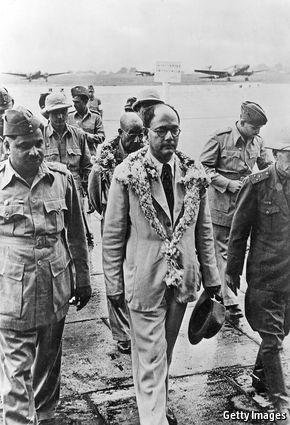A founding father of modern India continues to be a focus of speculation
IN THE West, regard for the founding fathers of independent India is usually confined to Mohandas Gandhi and Jawaharlal Nehru, the pacifist in a dhoti and the suave Cantabrigian. By contrast Subhas Chandra Bose, or “Netaji” (“revered leader”), took up arms against the British and sided with the Axis powers in the second world war, dying in a plane crash in 1945 in Japanese-occupied Taiwan. The British called him a quisling, but his martial valour still inspires Indians. In his native Bengal most public places seem to be named after him.
Yet in India the story of Bose’s life remains partially classified—supposedly on grounds of national security. So it made for good drama on January 23rd, Netaji’s birthday (in 1897), when the government of Narendra Modi declassified 100 of its files on Bose and promised more to come. They shed little light, but that is hardly the point. Bose is one of the few heroes of India’s independence movement that the prime minister’s Bharatiya Janata Party (BJP) can hope to claim—Gandhi and Nehru belong firmly to its arch-rival, the Congress party.
In West Bengal the chief minister, Mamata Banerjee, with her own party, declassified all the state’s files in September. Mainly they confirmed that the government spied on Bose’s family in the 1950s and 1960s. By publishing first, she pipped the BJP.
Bengalis have been clamouring for more disclosure, many with hopes of solving a mystery about Bose’s death. At one point, he considered disguising himself as a monk in Thailand to evade the Allies. Netaji was already famous for a daring escape in 1941, when he passed as an Afghan to cut a dash from Calcutta to Berlin. He then returned to the Pacific theatre by way of two submarines meeting near Madagascar. In the days after the Japanese surrender, might he have reached China or Russia, plotting a return to India? He could have challenged Nehru for the leadership and changed the course of Indian history. Or maybe he was already in India, hiding as a holy man? Two ashrams claim him.
All nonsense, says Krishna Bose, a former MP and the widow of Netaji’s favourite nephew—he drove the Bose getaway car in 1941, a German roadster that sits outside the Netaji Research Bureau she runs in Kolkata. There is no mystery, and no assassination—the plane crash was an accident.
So why have successive governments in Delhi kept the Bose files under seal? Presumably they were unflattering to Nehru and thus to Congress. Campaigning in January 2014, the BJP declared it would declassify all the files. So why only a dribble of information now? Rudrangshu Mukherjee, a historian of Bose and Nehru, says another rare hero of the BJP, Vallabhbhai “Sardar” Patel, loathed Bose. Or perhaps it pays to preserve a certain ignorance about Bose himself. One of Mr Modi’s 100 files, from 1976, finds the Indian embassy in Tokyo under pressure to repatriate Bose’s ashes from the Renkoji temple in Tokyo. At the time bureaucrats concluded that “due to possible adverse reactions from…certain sections of the public, who refused to believe in his death in the plane crash”, it would be wiser to do nothing.
Mrs Bose has devoted much of her life to collecting and preserving the historical record. She regrets that politicians are still fiddling with the facts. Another historian suspects a third possibility: sheer ineptitude on the part of the archivists.
Source: The Economist










